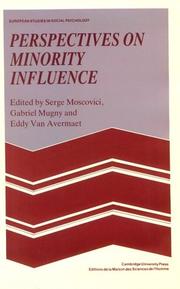| Listing 1 - 2 of 2 |
Sort by
|

ISBN: 0521246954 0521056381 0511897561 9780511897566 9780521246958 9780521056380 Year: 1985 Publisher: Cambridge
Abstract | Keywords | Export | Availability | Bookmark
 Loading...
Loading...Choose an application
- Reference Manager
- EndNote
- RefWorks (Direct export to RefWorks)
How does a minority exert influence on a majority? Traditionally social psychologists have characterised influence as a process leading to conformity - the minority coming to accept the view of the majority. For the contributors to this volume, working in a society where the reverse process is frequently exemplified - a society characterised by change and innovation - such an approach is no longer tenable. They believe that only by examining social processes also in terms of minority influence can the paradox be resolved. The volume is organised into two broadly based but interconnected parts. Part I analyses the process of influence itself, while Part II sets it within the context of groups. The influence of minorities is thus located within the cognitive and social field in which interaction between minorities and majorities occurs. The original and dynamic research paradigms presented here and the theoretical and empirical results that are reported offer alternative insights not only into the phenomenon of influence per se, but also into such classical notions as 'the group' , 'deviance' and 'convergence'.
Influence (Psychology) --- Minorities --- Power (Social sciences) --- Social conflict --- Social interaction --- 316.45 --- Human interaction --- Interaction, Social --- Symbolic interaction --- Exchange theory (Sociology) --- Psychology --- Social psychology --- Class conflict --- Class struggle --- Conflict, Social --- Social tensions --- Interpersonal conflict --- Sociology --- Empowerment (Social sciences) --- Political power --- Political science --- Social sciences --- Consensus (Social sciences) --- Conformity --- Example --- Persuasion (Psychology) --- 316.45 Sociale groepen. Groepsprocessen. Kleine groepen. Interactionele groepsdynamiek --- Sociale groepen. Groepsprocessen. Kleine groepen. Interactionele groepsdynamiek --- Sociology of minorities --- Political sociology --- Health Sciences --- Psychiatry & Psychology --- Social conflict. --- Social interaction. --- Psychology.
Multi
ISBN: 0521238625 9780521238625 9780521122559 0521122554 9780511897993 0511897995 Year: 1983 Publisher: Cambridge: Cambridge university press,
Abstract | Keywords | Export | Availability | Bookmark
 Loading...
Loading...Choose an application
- Reference Manager
- EndNote
- RefWorks (Direct export to RefWorks)
Left freely to themselves, a group of rational individuals often fail to cooperate even when the product of social cooperation is beneficial to all. Hence, the author argues, a rule of collective decision making is clearly needed that specifies how social cooperation should be organised among contributing individuals. Suzumura gives a systematic presentation of the Arrovian impossibility theorems of social choice theory, so as to describe and enumerate the various factors that are responsible for the stability of the voluntary association of free and rational individuals. Among other topics covered are an axiomatic characterisation of the concept of a rational choice, the simple majority decision rule and its extensions, the social choice implications of the concept of equity as nonenvy, the constrained majoritarian collective choice rules and the conflict between the Paretian ethics and the libertarian claims of individual rights.
Microeconomics --- Social choice --- Welfare economics --- 316.45 --- 316.323.65 --- Economic policy --- Economics --- Social policy --- Choice, Social --- Collective choice --- Public choice --- Choice (Psychology) --- Social psychology --- Sociale groepen. Groepsprocessen. Kleine groepen. Interactionele groepsdynamiek --- Verzorgingsstaat. Welvaartsstaat --- Social choice. --- Welfare economics. --- Economía del bienestar --- Kollektiventscheidung. --- Rationalität. --- Wohlfahrtstheorie. --- Économie du bien-être. --- Choix collectif. --- bien-être --- Fürsorge. --- choix rationnel (théorie) --- modèle mathématique. --- 316.323.65 Verzorgingsstaat. Welvaartsstaat --- 316.45 Sociale groepen. Groepsprocessen. Kleine groepen. Interactionele groepsdynamiek --- Economía del bienestar. --- Bien-être --- Choix rationnel (théorie) --- Modèle mathématique. --- Business, Economy and Management
| Listing 1 - 2 of 2 |
Sort by
|

 Search
Search Feedback
Feedback About UniCat
About UniCat  Help
Help News
News